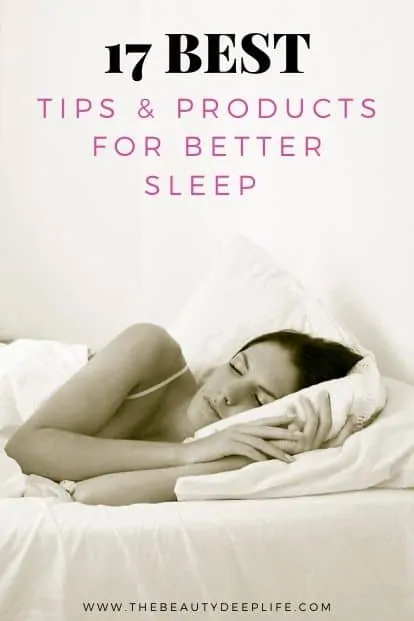
The Best Tips, Products, & Remedies For Better Sleep
Oh, the beauty of Slumberland, that elusive place we just can’t seem to reach! When it comes to sleep, we often complain of A) not getting enough of it, B) trouble falling asleep, C) not getting quality sleep through the night, craving a way to get better more consistent sleep, or D) all of the above.
I used to struggle with horrible insomnia. Mostly from stress (work-related) and worry weighing heavily on my mind. I’d just lay there unable to quiet my mind, thinking of my to-do list for the next day, or I’d get stuck checking my email and Facebook in bed.
Often, if I did happen to fall asleep (usually at 1 am), I’d then wake up at 3 am and continue to toss and turn. When morning came, I was utterly exhausted and came to rely on Starbucks with an extra shot or two of espresso. Can you relate?
Inevitably, I realized this was not a sustainable way of living. I needed to focus on practicing better self-care. In fact, one of the most basic and often neglected forms of self-care is getting enough quality sleep.
So, in an effort to fix my insomnia and have a healthier lifestyle, I began my quest for the “perfect sleep solutions” with a ton of research.
In the process, I learned a great deal about the impact lack of sleep can have on the body, the mind, and one’s overall health.
I always knew sleep was important, but I was quite surprised by the numerous ways it had been affecting me negatively and for so very long.
*This post contains affiliate links, which means I receive a small commission, at no extra cost to you, if you make a purchase using one of these links. For more info see Disclosure Policy. As an Amazon Associate, I earn from qualifying purchases.
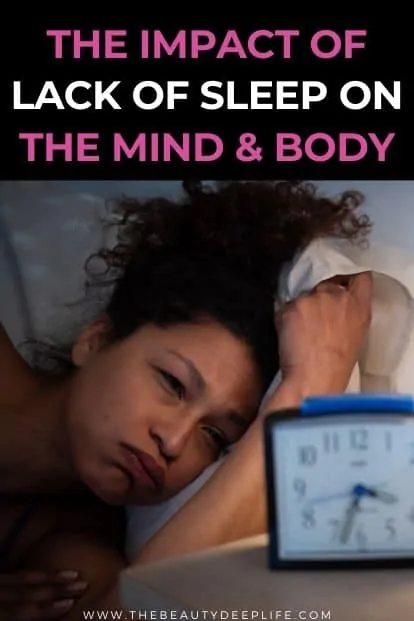
The Impact Of Lack Of Sleep On The Mind & Body
As mentioned, sleep is one of the most basic and fundamental means of practicing self-care. A good night’s rest with quality sleep is vital for our health mentally, physically, and emotionally. However, the reality is the majority of adults do not get quality, sufficient nightly sleep.
So, what happens when we don’t get adequate sleep? Well, lack of sleep has been linked to multiple health problems:
- A weakened immune system
- Excessive storage of body fat
- Increase in appetite cravings, which leads to weight gain (the body produces more ghrelin, the body’s hunger-stimulating hormone).
- Memory loss
- Increased blood pressure
- Impaired cognitive skills & performance (lack of focus or concentration, trouble learning new things).
- Infertility issues
- Decreased hormones
- Increased risk of suffering from stroke, diabetes, and heart-related diseases.
- Anxiety & Depression (it impacts the areas of the brain that influence our emotions, thereby affecting one’s mood and overall mental health).
Did you know that lack of sleep also speeds up the aging process of your skin?
And I don’t mean just dark circles or just puffy eye bags that make you look tired. Lack of sleep also leads to paler skin, fine lines, wrinkles, and loss of elasticity.
When you don’t get sufficient sleep, your body begins to produce too much cortisol, which breaks down collagen. By contrast, when we do get adequate sleep, the body can produce anti-aging hormones like HGH (human growth hormone), which helps with skin regeneration, restoration, elasticity, and skin cell turnover.
Sleep allows your skin cells to repair, recover, and renew. Ultimately, a good night’s sleep not only helps us feel our best, but it helps us to look our best too, ladies! I guess there really is such a thing as needing our beauty sleep…right!??
Related: For more info on how cortisol from both lack of sleep and stress can negatively impact your skin, check out our skincare post here!

17 Best Sleep Solutions: Tips & Products For Better Sleep
Whether you don’t get enough sleep, have trouble falling asleep, have difficulty getting quality sleep, or all the above…My goal is to help you get that beauty rest you have been seeking once and for all! And these tips and products can help Beauties!
My advice is to go through this list, play around with some, and see which ones work best for you. You can also try to create a nightly routine using a few of the tips (something easy you can follow each night before bed).
Guaranteed something or several things in this list will resonate with you and work!
Also, every now and then you can always switch it up and try something new from the list, just to see if that “something new” helps a bit better.
Quick Tip: Most of the sleep-aiding products in this article are on Amazon, so they can qualify for free, speedy 2-day shipping if you are an Amazon Prime member. Not a member? You can easily join for free and get a 30-day trial here!
Tip 1: Commit, Take Baby Steps, And Reset Your Body Clock
If you fall into the category of group A, you likely feel that you are not getting sufficient sleep and are tired all the time.
Tell me, how many hours do you generally sleep a night? Is it 5 hours? 6 hours? 7 hours?
Sometimes we go from extremes of getting too little one night or more than enough the next…maybe you do this also?
Make the commitment to yourself that you will work at getting 7+ hours of sleep a night and stick with it! You need to reset your body clock to get back onto a healthy sleep cycle. Here’s how…
- First, take a look at when you usually go to bed.
- Second, decide that tonight, you will try going to bed 15 minutes earlier (“baby steps”) than usual.
- Repeat and go to bed at this new time every single night for this week. No excuses! Just do it
! - Next week, take the time you have been going to bed for this first week and add on another 15 minutes (Week two, you will go to bed another 15 minutes earlier than Week one). Continue doing this every week, adding on 15 minutes, until you reach 7.5-8 hours of sleep a night consistently.
- Once you reach 7.5-8 hours a night consistently stay with it for a month. You will notice positive differences in yourself mentally, physically, and emotionally!
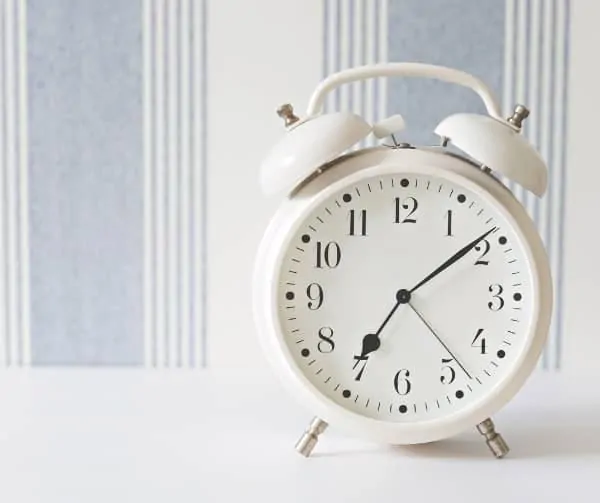
Tip 2: The Power Of Aromatherapy & Calming Scents
Try sprinkling a few drops of lavender essential oil under your pillow. I used to do this all the time, and it would work like a charm! In 20 to 30 minutes I would literally be knocked out!!!
I began this technique as an alternative to taking over-the-counter sleep meds. I often found Tylenol PM left me drowsy the next morning. So, I looked into essential oils as another option.
Well, let me tell you, not only will it help you to fall asleep, but it’s reported to increase your quality of sleep by 20%!
Lavender is known for calming both the mind and the body. In fact, it’s a wonderful remedy for those who suffer from stress, anxiety, insomnia, and restless sleep.
If you don’t want to use this oil under your pillowcase, you could instead use it with a diffuser in your bedroom. A third option would be to use an actual pillow spray!
Our Top Product Picks For Better Sleep:
- NOW Essential Oils, Lavender Oil – Sprinkle a few drops under your pillow before bed. Lavender assists in relaxation, helping you to fall asleep faster and sleep more soundly.
- ThisWorks Sleep Plus Pillow Spray – Containing Lavender and Camomile, it’s sure to get you a good night’s sleep! Just spray and catch some ZZZs! Chamomile, like lavender, is a very soothing and calming oil that works to reduce anxiety and stress.
- InnoGear Aromatherapy Essential Oil Diffuser – If you would rather not involve your pillow in the whole process, this is a great option to infuse the room with relaxing lavender oil!
Tip 3: Relax With Music, Nature Sounds, White Noise, Pink Noise, Or Meditation Audio
This has worked for me quite well!!! The key is to block out any unwanted sounds in your environment that could interfere with your sleep while providing an alternate calming sound instead.
I have often bought CDs and MP3s or played tracks on my phone as I would drift off to sleep, relaxing to the sounds of nature like rain, ocean waves, or a babbling brook. I personally prefer the sounds of nature over music…but you should try them all and see what works best for you.
In fact, the National Sleep Foundation states that listening to relaxing music about 45 minutes before bedtime can significantly help adults “…fall asleep faster, sleep longer, wake up less during the night…”
Our Top Product Picks For Better Sleep:
Music, Nature Sounds, & Meditation Audios:
- Slow Wave Sleep – Meditation audio that uses delta waves to the sound of the ocean waves! Ideal for insomnia, to reduce stress, and to achieve the benefits of restorative quality sleep…For info on delta wave audios and how they affect your sleep, click here or scroll to the bottom of this post.
- Sound Sleep – This audio has actually “been successfully used in biofeedback clinics for treating sleep disorders.” It uses music and delta frequencies only to quiet your mind, relax you, and help you reach a deep level of quality sleep. According to the creators, “a few hours of sleep a night with this program will make you feel as though you had a full eight hours of rest.”
- Deep Sleep – This audio helps to distract your mind from anxious thoughts so that you can have a deeper restful night’s sleep. It uses delta wave frequencies, soothing music, and subliminal messages “to calm worrisome thoughts and reduce stress.”
- Healing Sleep – This combines both previous audios listed…Deep Sleep and Sound Sleep.
- You should also look into getting some sleep headphones. Many are made as a combined sleep mask too. Here are some options to check out!
Noise Machines:
- SNOOZ White Noise Sound Machine – App-Based Remote Control, Sleep Timer, and Night Light – Cloud – Provides white noise to block out a multitude of sounds (noisy neighbors, loud streets, and even snorers) plus you can use it on the go for traveling!
- Marpac Dohm Classic Original White Noise Machine – Great for adults, babies, kids, and even dogs!!!
- Adaptive Sound Technologies LectroFan High Fidelity White Noise Sound Machine – 20 Different sound variations to choose from, including both white and pink noise!
- Honeywell Dreamweaver Sleep Fan – Not only does this one provide relaxing pink noise to mask out unwanted sounds, but it’s also a fan, thus helping to keep the room’s temperature cooler.
Tip 4: Shower & Dryer Trick For Sleep
We all know that taking a nice, warm shower can help you to relax physically. Not to mention, your muscles and joints benefit tremendously.
Well, here’s a little trick you can try sometime to take that relaxation up a few notches right before bed…First, be sure to use a lavender shower gel like this one! Then, directly before you jump in your shower, grab a towel, and put it in your dryer.
By the time you get out of the shower, you will have a warm, and cozy towel to roll up in! Plus, those lavender suds will get you into a nice and calm mental state!
Our Top Product Picks For Better Sleep:
- Bath & Body Works Aromatherapy Sleep – Lavender + Vanilla Body Wash + Body Cream Bundle – I personally love anything with vanilla! Vanilla contains relaxing and soothing properties, which also aid in sleep.
- Bath and Body Works Lavender Chamomile Body Wash – Two punches in one, using both lavender and chamomile to relax and calm you into a lovely slumber! Great for relieving mental stress and anxiety! Chamomile has been used for centuries to help with various health issues. This herb is known for its calming and soothing effects.
- Dr. Bronner’s Pure-Castile Liquid Soap in Lavender – Soothing and calming scent!!
Tip 5: Relax The Body With A Lavender & Honey Milk Bath
Even more relaxing than a shower, is a milk bath fit for a queen!!! It’s the perfect way to get an incredibly good night’s sleep and give you soft, smooth, youthfully supple-looking skin! Add some milk, honey, and lavender to your bath water tonight!!
Fun Fact: Did you know Cleopatra, known for her beautiful skin, would bathe in milk and honey?? Some say she added lavender and rose petals as well.
Recipe for a Lavender & Honey Milk Bath:
- Milk or Milk Powder – Containing lactic acid, it exfoliates and removes dead skin cells while you soak without the need for scrubbing. Lactic acid is a natural, mild alpha-hydroxy acid that is great for a little gentle exfoliation. The healthy fats and protein found in milk also aid in hydrating the skin. You will need 1- 2 cups of whole milk for best results. As an alternative, try powdered milk using 1/3 to 2/3 cup!
- Honey – Having anti-bacterial, antioxidant, and antifungal properties, it is excellent for inflammation and soothing the skin. You will need about a ¼ -1/2 cup of honey. Fun Fact-Combined milk and honey work together to slow down the aging process- apparently, they help with fine lines and cellulite both!!
- Lavender Essential Oil – Finally, the pièce de résistance!!! It is wonderful for its calming effect and perfect for getting you nice a sleepy! Simply add in a few drops of Lavender Oil along with 1 Tablespoon of Coconut Oil to dilute it a bit!
- Optional add in a handful of rose petals.
Combine all ingredients in a bowl, stir well, and then add to the warm bathwater. Allow yourself to soak for a minimum of 20 minutes. You can also gently rub the skin with a damp washcloth for added exfoliation. Once you are done bathing, be sure to thoroughly rinse off your body and apply a moisturizer. Soon you will have beautiful skin fit for a sleeping queen!?
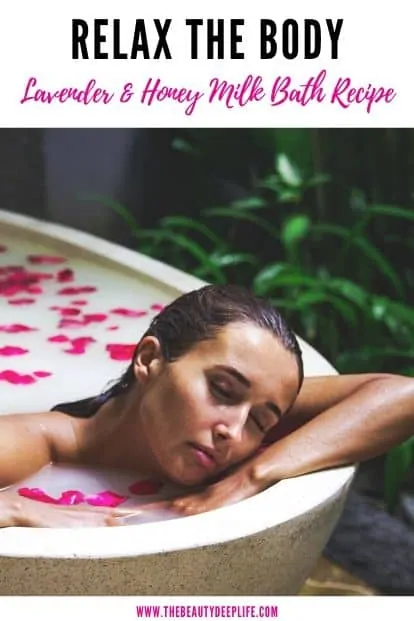
Tip 6: Create A Calming Environment
Your room should have minimal lighting as you unwind and get ready for bed. A light that does not come from a natural source, like the sun, can impact your sleep patterns.
Naturally, as it gets dark outside, our bodies are meant to release melatonin (the body’s sleep hormone), and our body temperature is meant to drop. Thereby, signally it’s time for sleep and preparing us for the sleep process. Alternatively, when there is light, it’s a signal for our bodies to increase temperature and we produce hormones like cortisol.
But electronics and lights in the home can throw a monkey wrench in this natural process. Our bodies suddenly don’t know whether they are supposed to warm up or cool down, and don’t know when to produce melatonin.
Before bed turn off the TV and turn the alarm or any electronics with visible lighting away from the bed. If you struggle with creating a calming sleep environment due to outside lights and sounds, look into using blackout curtains…they can significantly block out excessive light while absorbing unwanted sounds. Another option for minimizing visible light, try a sleep mask!
Our Top Product Picks For Better Sleep:
- Asutra Weighted Silk Sleep Mask – This is an aromatherapy and light-blocking mask all in one. It’s filled with Organic Lavender and Flax Seeds! This one is great for getting a relaxing night of quality sleep!
- Jersey Slumber 100% Silk Sleep Mask – This one is great for at home or for flying!! One of Amazon’s Best Sellers too!!
- Room Darkening Blackout Curtains – Nothing like absolute darkness to help you sleep like a little baby! There are many great brands out there!
Tip 7: Unplug & Turn Off
If you have trouble falling asleep, it is essential to unplug from social media, your email, the internet, and television an hour or more before bed. All of these things are very stimulating to the mind, so you want to give it adequate time to relax and disconnect from all the visual stimuli.
You also want to turn your phone off a minimum of an hour before bed or switch it to silent. Ignore it after that and let yourself relax. Just make sure you keep your alarm set for the morning if it is on your phone. If your phone doesn’t let you set the alarm while it is on silent, then you may need to go old school and purchase an actual alarm clock.
Tip 8: A Comfortable Room Temperature
The key to falling asleep but, more importantly, staying asleep, as in getting good quality sleep, can often relate to environment and temperature. You should try to keep the temperature in your bedroom on the cooler side, around 60-70 degrees.
When the temperature is cool, your body can more easily produce melatonin. The higher your melatonin levels, the better sleep you can expect to get. The average person will find they sleep far more soundly in a cool environment.
When the room is too warm, you are more likely to toss and turn or have bad dreams. I know for me personally, if the room is too warm, I have bad dreams all night and never get a good night’s rest. In addition to keeping the overall temperature low, I use a fan near my bed for a gentle cool breeze while I sleep!
Our Top Product Picks For Better Sleep:
- Coop Home Goods – Shredded Memory Foam with Zippered Cover Hypoallergenic Cooling Gel Infused Memory Foam Fill – If you are a bit of a hot sleeper, you will love this temperature-cooling pillow! Unlike other traditional pillows that trap heat, this one will keep you cool.
- Fishers Finery 25mm Luxury 100% Pure Mulberry Silk Pillowcase – The perks of a silk pillowcase are that it not only remains cooler for sleeping but it’s beneficial for beauty as well! Sleeping on a silk pillowcase helps prevent hair breakage!
Tip 9: Consider Your Mattress
An older mattress can significantly impact the quality of your sleep, not to mention it can create problems with your back and joints. You want something both comfortable and supportive while you sleep.
You should consider replacing your mattress every 7-10 years. However, this can be a bit pricey for most people, so the next best thing to do is to find a mattress topper instead.
Our Top Product Picks For Better Sleep:
- LUCID Lavender Memory Foam Mattress Topper – Comfortable and supportive for your body’s pressure points!! It comes with a lavender scent too!
- LUCID 2 Inch 5 Zone Gel Memory Foam Mattress Topper – Memory Foam Topper but without the lavender scent!
- Linenspa, 2 Inch Gel, Infused Memory Foam Mattress Topper – Perfect for making any old or hard mattress comfy and supportive!!
Tip 10: Good Ole’ Tryptophan
It’s so cliché, but it does work! Before bed try warming up some milk and drinking it. The reason this works is that warm milk creates tryptophan. What is tryptophan? Well, it is a sleep-inducing amino acid. In fact, it’s the very reason you always get incredibly tired after Thanksgiving or Christmas dinner. Turkey also has tryptophan in it!
Tip 11: Consider A Melatonin Supplement
If you are looking for something you can take over the counter to help you sleep, melatonin may be an option. Melatonin is a hormone naturally produced by our bodies and is called the “sleep hormone”. As the level of this hormone increases in your body, it prepares you for sleep, relaxing the body and telling it that it’s time for bed.
Many people create enough melatonin naturally, however, those individuals with sleep disorders could benefit from using a melatonin supplement over a short period of time (to be safe you want to limit use to just short term). If you struggle with falling asleep and staying asleep, your body may not produce enough melatonin.
First, you should always consult with a doctor before using any supplements. Second, if your doctor approves the usage, you want to start out at a very low dose. Generally, a low dose is considered to be around .5 -1mg taken 30 min to an hour before bed. *This is not medical advice, please seek a doctor before starting a supplement.
Our Top Product Picks For Better Sleep:
- Nature’s Bounty Melatonin 1 mg, 180 Tablets – An excellent option for starting out on a low dose! Fall asleep faster and sleep more soundly. Also, great for quieting the mind before bed if you have anxiety.
- Pure Encapsulations – Melatonin 0.5 mg – An even lower dose option for starting out with melatonin!
Tip 12: Consider Magnesium
If you haven’t done so already ladies, you should get checked out by your doctor to see if you have a magnesium deficiency. Often women with a magnesium deficiency may struggle with achieving quality sleep and reaching a level of deep sleep, as they are restless in bed tossing and turning.
Magnesium assists with our ability to sleep in two ways: 1) It helps boost the production of melatonin (sleep hormone) and 2) It enhances GABA, a neurotransmitter the body produces naturally that is responsible for relaxation and calming of the brain and muscles.
Ultimately magnesium can help you fall asleep quicker and improve overall sleep quality. However, before taking magnesium supplements, consult with your doctor, as it can interact with some medications.
If you have kidney or heart problems, blood clotting issues, or are pregnant and/or breastfeeding, you may need to steer clear of this supplement. For other women, if your doctor approves your need for a supplement, keep in mind that dosage can vary based on age and health conditions.
Ask your doctor for a recommended dosage. The total RDA for adult women ranges based on age from 310-320mg a day (food & supplements combined). Generally, it’s best to start at a low dose (100mg) like this one (Doctor’s Best High Absorption Magnesium Glycinate Lysinate and increase as needed. *This is not medical advice, please seek a doctor before starting a supplement.
PRO Tip: The types of oral magnesium that are best absorbed by the body are magnesium citrate, aspartate, and glycinate. Keep in mind, that taking too much magnesium can cause side effects like stomach cramping, diarrhea, bloating, or nausea.
Alternative Ways to Get More Magnesium:
- If you want to avoid a supplement you can get a decent amount of magnesium from a diet rich in the following foods: dark leafy greens (spinach, swiss chard), nuts (almonds, cashews brazil, walnuts), avocado, bananas, seeds (pumpkin, sunflower, sesame), vegetables (broccoli, squash, brussels sprouts), and soy products.
- Take a hot bath before bed using Epsom salts containing magnesium sulfate. This way, the magnesium can be absorbed through your skin.
- Apply magnesium oil to your skin before bed!
- Have a yummy hot magnesium-based beverage. (see below suggestion)
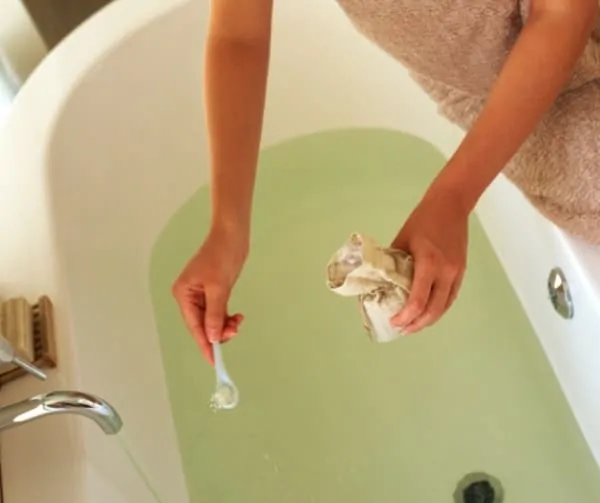
Our Top Product Picks For Better Sleep:
- Epsoak Epsom Salt 19lbs Magnesium Sulfate USP Resealable Bulk Bag – Relaxing and soothing for sore muscles. Allows you to naturally absorb magnesium through your skin for stimulating melatonin production and enhancing GABA!
- Dr. Teal’s Epsom Salt Soaking Solution, Soothe & Sleep, Lavender, 3lb – Works
as a 2 for 1: helps to reduce stress and anxiety with the use of both magnesium sulfate and lavender! Relaxing for muscles as well! - Ancient Minerals Magnesium Bath Flakes of Pure Genuine Zechstein Chloride – Used for a bath to relax the body, help with muscle soreness and pain, reduce stress, and help with sleeping (promotes better quality sleep)!
- Ancient Minerals Goodnight Magnesium Lotion with Melatonin – Containing both magnesium and melatonin, just one pump applied topically about 30 minutes before bed and you can relax into a peaceful slumber!
- Natural Vitality Calm, The Anti-Stress Drink Mix: My sister got me hooked on this…She would often drink it with hot water before bed and then knock out in a good 15-20 minutes. When I noticed how sleepy it made her, I started drinking it myself, and to my amazement, it also really helped me to easily drift off to sleep!
It’s also great for calming your mind and helping you to relax enough to fall asleep if you struggle with stress or anxiety at bedtime. I was always a fan of the raspberry lemon and lemon flavors.
Tip 13: Nip The Wandering Mind In The Bud
Often you find yourself laying in bed thinking about your to-do list, what needs to be done the next day or for the week. A very helpful thing you can try to do is to keep a little notepad or journal close by on your nightstand.
That way, as you drift off to sleep, if you think of something or a thought pops into your head, you can quickly write it down and then rest your head back down upon your pillow.
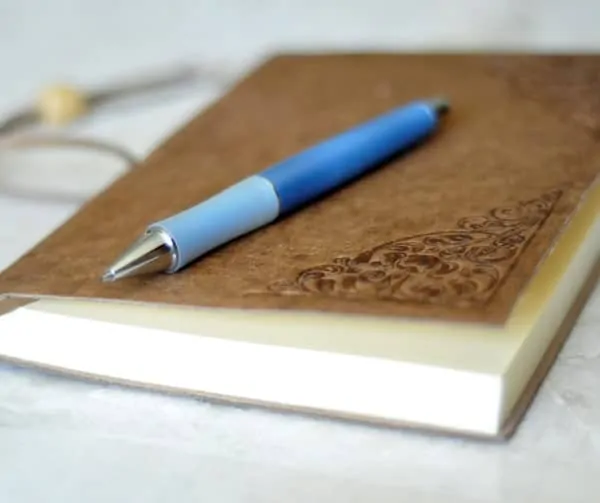
Tip 14: Breathing Exercises
Another way to relax is to try a few breathing exercises. You want to take deep breaths and focus on your breathing. You should inhale for 1…2…3…4…5. You can count in your mind if that helps. Then you should exhale 1…2…3…4…5. Inhale slowly and deeply for 5 seconds, then exhale for 5 seconds.
Tip 15: Be Aware Of Your Meals Before Bed
Generally, you should avoid having a heavy meal about 2 hours before bed to reduce indigestion. However, if it feels like you’re going to bed on an empty stomach, a light snack can help, especially if you tend to wake up in the middle of the night to a grumbling tummy. Something light, like some yogurt or a glass of milk, can do the trick. Not to mention, the magnesium and calcium in milk help with the production of melatonin.
Tip 16: Substances To Avoid
It’s best to avoid all types of caffeine about 4 – 6 hours before bed. Doing so will help you to stay asleep at night.
If you want some tea, however, consider an herbal chamomile tea. Chamomile is caffeine-free and known for its calming effects. It’s a great natural sleep aid alternative!
Our Top Product Picks For Better Sleep:
- Celestial Seasonings Herbal Tea, Chamomile – I LOVE THIS TEA, it’s so relaxing!! Chamomile has been used for centuries and is known for its mild sedative effects.
- Bigelow Benefits Sleep Chamomile Lavender Herbal Tea – Combined lavender and chamomile for a super calming effect!
Tip 17: Exercise
Try to get in some form of daily exercise. You could simply take a brisk walk outside around your neighborhood for 10-20 minutes. Just be sure to avoid working out too close to bedtime (shoot for a minimum of 2.5 to 3 hours before bed). But if you can work out earlier, then so much the better.
When you exercise, your body temperature increases, and you can stimulate cortisol, which can sometimes interfere with sleep. Therefore, if you need to work out close to bedtime, stick to something relaxing like yoga.
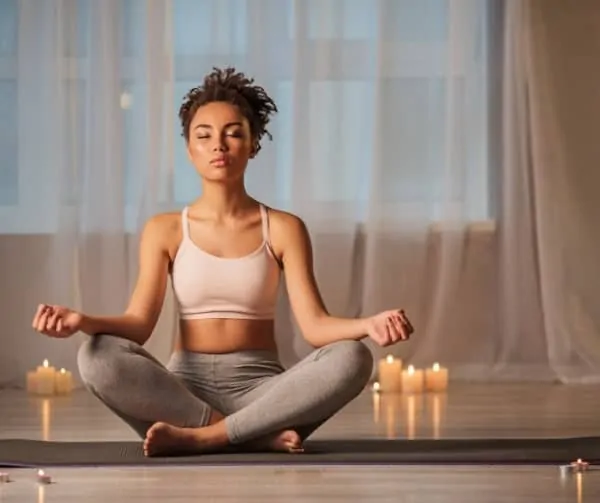
Common Questions/FAQ About Insomnia & Solutions For Better Sleep
How Can I Improve My Deep Sleep?
If you find even after getting 7.5 to 8 hours of sleep a night you still feel run down and exhausted the next day, it is possible you are not getting adequate deep sleep.
As we sleep, our bodies go through several stages based on our brain waves. In the first two stages, the brain produces alpha and theta waves, moving from alpha to theta.
Then the brain moves into stages 3 and 4, into the “deep sleep stage” also referred to as the delta stage. This is the most restorative phase. During this phase, the brain waves slow down.
Following this is the REM stage where you dream.
You continue to go back through the sleep stages throughout the night. But the delta wave phase is essential for helping you to feel revitalized and recharged when you wake up in the morning.
To improve your deep sleep, you need to improve delta brain waves. You can do so using the following:
1) Try Pink Noise – Pink noise is like white noise but more closely mimics the sounds of nature (like rainfall or the soothing waves of the ocean).
Studies have shown that pink noise promotes longer phases of deep sleep. As a result, it can help you to feel like you have had more quality, restorative sleep each night.
2) Delta Hypnosis Audios & Delta Brainwave Audios – Both options will allow you to spend a longer time in the deep sleep stage of Delta.
Also, listening to this type of audio relaxes the mind and helps your brain to enter the delta wave stage more easily. As you hear the audio, your brain gently and naturally tries to sync its waves up with the sound waves of the playing audio track.
Ultimately, you use external sound stimuli to help your brain’s natural waves ease into the desired delta brainwave state.
I’ve used many of these types of audio, and they work like nothing else out there!!! They are amazing!! Check out Tip 3 in this post for some highly effective suggestions to try.
How Do I Stop Overthinking Before Bed?
Generally, overthinking before bed is related to worry and stress. As a result, falling asleep can be a major struggle as your mind wanders from issue to issue. The good news is there are things you can do to reduce this.
Learn to manage your stress…
- Designate a specific time during the day that you allow yourself to address your worries.
- Restrict this chunk of time to only during the day, no later than late afternoon/ early evening (6 pm at the latest). For example, say you decide that 5 pm is your designated time slot. Worries are no longer allowed for evening and nighttime!
- If a worry enters your mind, write it down and save it for tomorrow. You won’t address or acknowledge it until tomorrow during your next designated time slot.
Create a nightly routine geared towards unwinding, relaxing, or that helps to distract & slow down the mind.
- Use as much as 2 hours to as little as 45 minutes, where you engage in this nightly routine.
- While 45 minutes may be the minimum, I still suggest that during an hour or more before bed you avoid all work, emails, social media, phone use, screen time, etc. (Tip 7).
- If you shoot for 1 to 2 hours, you can try some light reading and listen to relaxing music.
- If you shoot for 45 minutes to an hour you can try some meditation, relaxing music, or nature sound audios (Tip 3), a soothing shower or bath using lavender or lavender with chamomile (Tips 4 & 5), aromatherapy using lavender or lavender with chamomile (Tip 2), using melatonin or magnesium in its variety of forms suggested above (Tips 11 & 12), sipping on some chamomile tea (Tip 16), etc.
- During the 20 minutes for bed, you can try some relaxing breathing exercises.
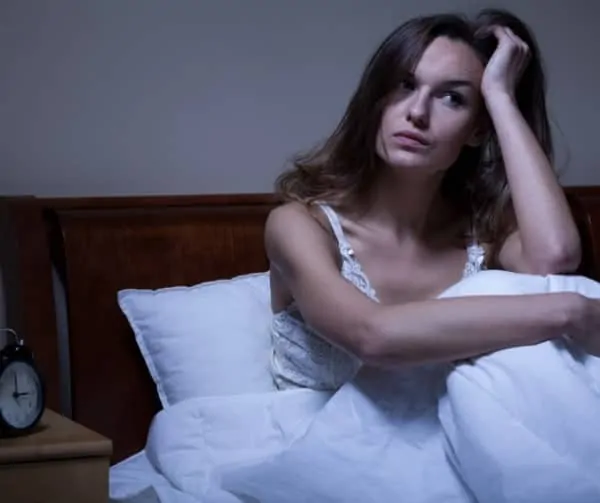
How Can I Sleep Better With Anxiety?
Luckily most of the tips in this post help with relieving anxiety before bed. Here are some things that helped friends and myself that you should try…
- I personally found that using lavender in my nightly routine with aromatherapy and relaxing baths helped the most. Some other essential oils that can help when used in a diffuser for your room are rose, chamomile, vanilla, jasmine, geranium, ylang-ylang, and patchouli.
- Exercise has been linked to lowering anxiety…so try to get in some movement in the morning or afternoon. Yoga is also a great option to help you wind down if you choose to exercise later in the day.
- In the early evening, try a meditation audio designed to relieve anxiety to help you wind down from the workday. My favorite: this one for anxiety!
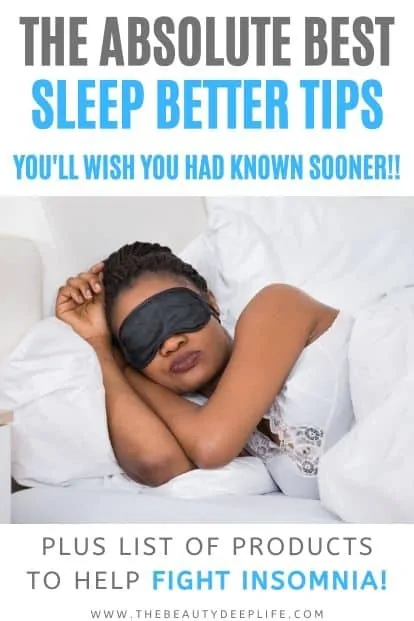
The Last Thing You Need To Know About Getting Better Sleep
Making sleep a regular self-care practice and priority is beneficial for your mind and your body, your mental, emotional, and physical health all-around ladies!
When you’ve suffered from sleep deprivation and are able to finally find a solution, it can be such a relief. In fact, it can be life-changing!
Luckily, you can improve your sleep problems easily by implementing just a few new things as I did. Whether it’s making a few shifts in your schedule, working on your environment and making it more conducive to sleep, trying some new nightly routines to help you relax before bed, or making a few lifestyle changes, you are just a few steps away from reaching the ultimate slumberland!
Do you make sleep a priority in your life? What works well for you? If you try any of these tips, drop a comment below letting me know what worked best for you!
Do You Struggle With Wellness & Self-Care Practices?? Get Our FREE List of 70 Self-Care Ideas For Women!! Click Here For Access!!
We are a participant in the Amazon Services LLC Associates Program, an affiliate advertising program designed to provide a means for us to earn fees by linking to Amazon.com and affiliated sites. For more info see Disclosure Policy.



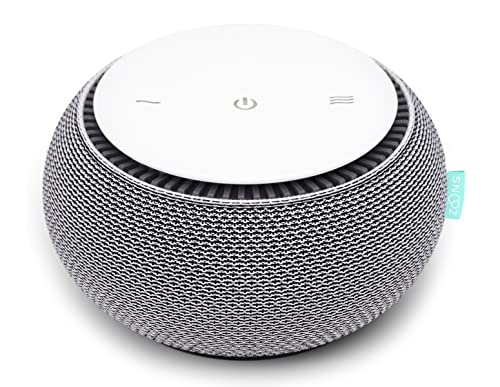








Good sleep is needed for everyone. Sleeping well relieves our fatigue. I read your post I think you posted a very useful content. In fact, these products are needed for good sleep. These can help you sleep better. Thank you for making such a useful post
Glad you liked it! 🙂